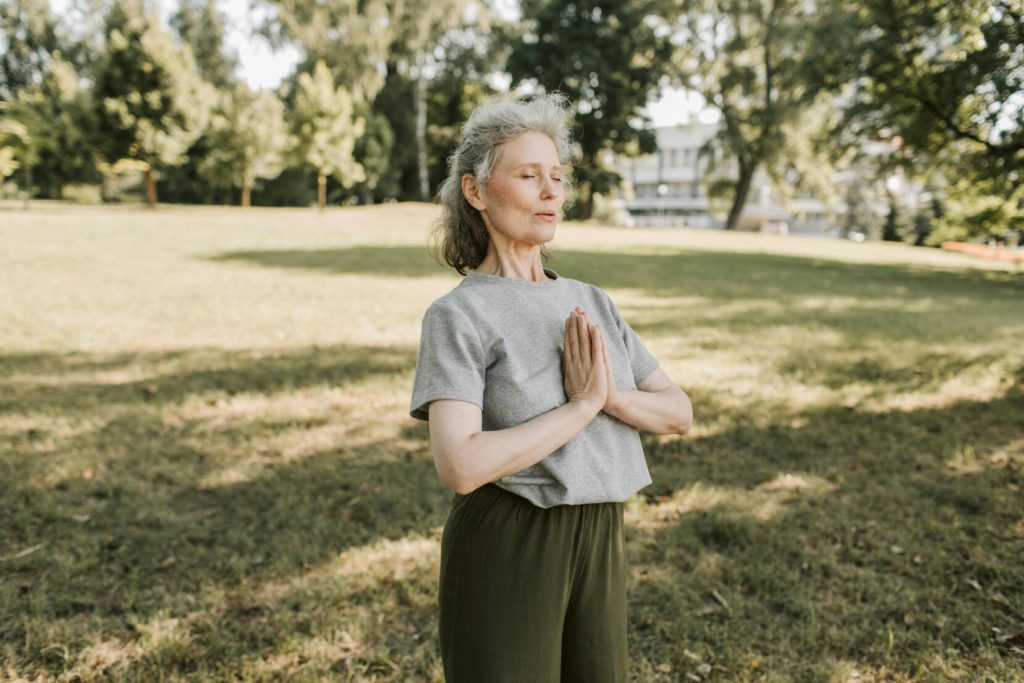Every woman experiences menopause. If you’re busy looking after everyone else in your life and putting yourself last, it’s time to make your menopause health a priority.
I didn’t know that perimenopause was looming (honestly, I didn’t even know what perimenopause was!). As a working mum with kids in school, I was juggling it all, with school runs, after school activities and housework and often neglected my own self care. It wasn’t until perimenopause hit that I realised I was struggling to cope. The lack of energy and fatigue from tossing and turning all night due to hot flushes, brain fog and mood swings that seem to come from nowhere, was relentless.
I realised very quickly that I had a lot to learn about what was happening to my body, and to me as a person, as I was not feeling like myself anymore. That’s when I discovered that self care was the foundation for managing menopause and staying healthy. Nutrition is important for health, but the foundations that underlie nutrition are the real game changers for menopause management and health. Our lifestyle habits – sleep, stress and movement play an integral role in our menopause health and wellbeing.
Getting Good Sleep in Menopause
Sleep is the foundation of health. If you are not sleeping well, you will know how debilitating it can be not to feel rested. Hormonal shifts in menopause often disrupt sleep, causing hot flushes, night sweats, waking up for the bathroom, or waking for no reason at all. Getting back to sleep can be difficult, and you may find yourself lying there wide awake for hours, only to fall asleep when it’s almost time to get up and start the day. Unfortunately, poor sleep can make hot flushes, brain fog and fatigue worse, and lack of good quality sleep over the long term can lead to an increased risk of chronic health conditions such as diabetes and heart disease.
To get better sleep, try these tips:
Stick to a bedtime routine:
Go to bed and wake up at the same time each day, as it helps to regulate your sleep-wake cycle.
Create a relaxing sleep environment by keeping your bedroom cool, dark and quiet.
Minimise distractions like pets and screens.
Move your body throughout the day
Even a slow walk outside in the fresh air most days of the week will have a positive effect on your sleep.
Relaxation Techniques
Breathwork, meditation or yoga nidra can help calm your body and mind and help you get to sleep. These are also great to use when you wake up in the middle of the night and can’t fall back to sleep.
Managing Stress in Menopause
High stress levels can make menopause symptoms worse, and our ability to deal with stress can become more difficult due to living a busy lifestyle. If you are experiencing stress for a long period of time, this will eventually result in lowered immunity (getting sick easier, longer recovery) and weight gain due to the shifting hormones.
To get a hold on managing stress, try these tips:
Reconnect with hobbies
Doing something you love can help take your mind off stress and bring some joy back into your life. It lowers stress hormones and promotes relaxation.
Practice Breathwork
Diaphragmatic Breathing can help calm down your nervous system, and it is at your disposal anytime you need it.
Sit comfortably placing one hand on your chest and one hand on your belly. Breathe in through your nose for a count 4, hold it for a count of 2 and breathe out for a count of 6. Making sure the out breath is longer than the in breath. Do as many rounds as you need, feeling your belly move with each breath.
Eat Mindfully
Be aware of what you eat when you feel stressed
Sit down for meals and savour every mouthful without distraction
Chewing your food well helps digestion and keeps you in the moment

Finding Movement that Feels Good
When you’re exhausted, moving your body can feel like the last thing you want to do. But moving your body in menopause is important. It is essential to maintain your muscle and bone strength and it’s really good for your mood and sleep regulation. Joyful movement is all about finding movement that makes you feel good, rather than doing it to achieve an external outcome, such as to lose weight or centimetres.
To find your Joyful Movement, try these tips:
Reconnect with past activities
Think about activities you haven’t done in a while. Can you start again?
Choose Gentle Activities if you are feeling tired
A slow walk around your neighbourhood or gentle stretching at home. Self kindness is the key here, gone are the days of pushing through regardless of how we feel.
Be consistent
Keep your movement goals small and attainable, and slowly work yourself up to longer sessions over time to reap the benefits of movement.
Nourishing Your Body for Good Health
Gone are the days of following diets. Menopause is a time to focus on whole, nutrient-rich foods that fuel your body. It’s an important time to focus on bone, heart and brain health to prevent chronic diseases such as diabetes, heart disease and osteoporosis. Important nutrients to include are protein, healthy fats, carbohydrates, vitamin D, calcium, and fibre. Research recommends the Mediterranean style of eating, as it is high in these nutrients, and also promotes a lifestyle that is balanced for good health.
To Fuel Your Body with Good Nutrition, try these tips:
Build a Balanced Plate
For each meal, aim for half of the plate to be vegetables, a quarter of protein, and a quarter of carbohydrates with healthy fats added in.
Stay Hydrated
Drink at least 2 litres of water daily to help with hot flushes and prevent dehydration.
Plan ahead
Create weekly menu plans so that you stay organised on busy nights and make balanced eating easy.
Self care in menopause isn’t about perfection, it’s about giving yourself the kindness and attention you deserve. By focusing on sleep, managing stress, moving in ways that feel good and nourishing your body with good nutrition, you’ll be better equipped to handle the changes that menopause brings. So, what will you start with today? Maybe it’s fine tuning your sleep routine or taking a short walk in the sunshine, whatever you choose to do, know that it’s a good step forward to taking care of you.
By Megan Martin , Menopause Nutritionist and Health Coach
About the author
Megan Martin is a Nutritionist and Health Coach who supports women in the menopause years in her practice, Healthy Balance Nutrition. Megan believes that education and support in self care and nutrition is foundational for women in menopause to future proof their health. She holds a Bachelor of Science (Biological) degree, and a Graduate Diploma of Human Nutrition, both from Deakin University. She lives and works in Melbourne, Australia. To learn more visit her website at www.healthybalancenutrition.com.au
You may also like
-
Jacqueline Carson on The Mind-Body Connection: How Your Thoughts Shape Your Health
-
Coffee with the Universe: Creating a Sacred Daily Practice
-
Aliesha Embleton on Building Resilience and Self-Care: A Lifelong Foundation for Growth
-
Dr Stacey Anwin on Writing for Self-Care
-
ADHD-Friendly Self-Care Practices: How to Prioritise Your Mental, Emotional, and Physical Wellbeing
